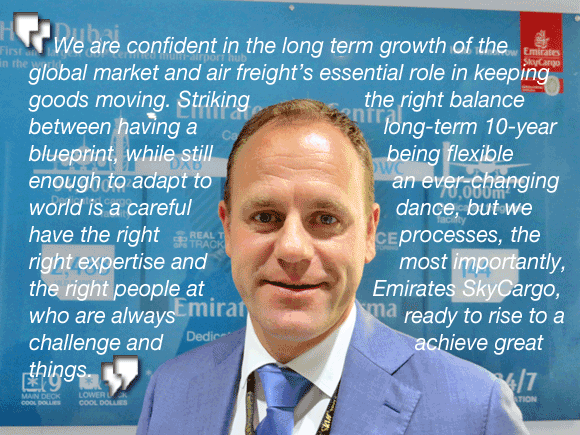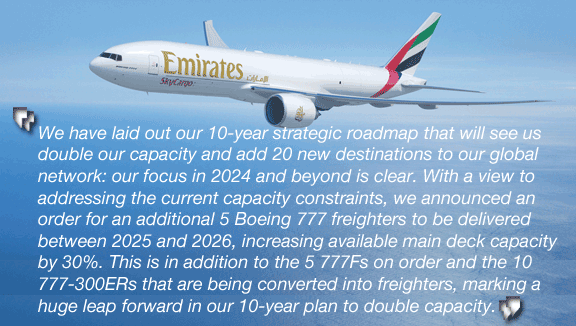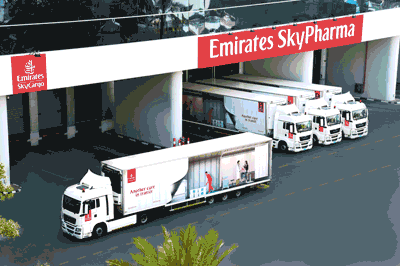Jeffrey Robin van Haeften is a distinguished professional with
a robust educational journey, which includes the IMD in Lausanne, the London
Business Schooland the Nyenrode Business University. Senior Vice President
of Cargo Commercial Worldwide at Emirates SkyCargo, Jeffrey is responsible
commercial vision and strategy for the cargo division. Prior to his tenure
at Emirates, Jeffrey held key positions at CEVA Logistics and DHL Global
Forwarding, both enterprises in leading positions within the freight forwarding
community.
FlyingTypers
engaged Jeffrey van Haeften in a conversation spanning through success (obviously)
and second thoughts: it all started from explaining the possible confusion
about SkyCargo’s role in Logistics and its importance.
This
is what van Haeften’s wanted to express in this regard to the layman
and/or the newbie, possibly imagined as his younger self: “'The
World Works Better with Emirates SkyCargo' is Emirates’ most
recent advertising campaign, highlighting the crucial role of air cargo
in making the world a better place: putting brides and would-be fiancés,
patients and doting family members, pet-owners and children, all front and
centre of the scene to help the public understand the essential role logistics
plays in their lives every single day, and the significant impact an organization
like Emirates SkyCargo can have all over the world. Working at Emirates
SkyCargo, a leading partner for the world’s supply chains, is one
of the most exciting, direct ways of making such experience. Maybe it does
not always start as a bed of roses, but . . . embracing
the temporary discomfort of something new, broadening your perspective and
stepping outside of your comfort zone are essential. This is the advice
I offer to those who are just joining the industry. This is an essential
skill in life, not just in our business.”
FT
was impressed by his interlocutor’s enthusiasm with regard to
air cargo, in particular considering Jeffrey’s background in the forwarding
sector. We mutually observed that globally the logistics industry grapples
with a scarcity of labour, which will dictate the needs of the future in
a landscape where the situation seems unlikely to improve.
“The
potential deployment of AI-powered robots to work in warehouses could solve
the current workforce challenges. On the other hand, by introducing innovative
technology and elevating our facilities with cutting-edge tools, we will
attract the best talent on the market. There is a growing need for technology
and digital tools to help accelerate air cargo and streamline global supply
chains. AI and machine learning algorithms offer opportunities for air cargo
companies to refine route planning, implement predictive maintenance strategies
for their fleet, and improve overall operational efficiency. Such technologies
can also help monitor environmental conditions, such as temperature and
humidity, in real-time. This ensures the safe transportation of sensitive
cargo, such as pharmaceuticals and perishable goods, while also providing
valuable data insights for continuous service improvement.”
 |
FT was enthralled by the relative ease
with which his guest was handling complex situations and his suggestions,
which clearly showed optimism and forward thinking. Diplomacy, collaboration
and decisive decision making were identified by van Haeften as the legacy
he received from the business leaders he had worked with: “convincing
but also open to being convinced, remaining open to the perspectives and
opinion from different people and welcome a healthy debate, as long as
all interactions are underpinned by respect.”
After the scene setting it was high time to talk
about figures and plans for the future: “Having looked at
the first part of 2024, it has already been an impactful year for Emirates
SkyCargo. The offering remains in demand, with longstanding and new customers
valuing the innovative product portfolio of Emirates’ extensive
global widebody network and world-class capabilities. In the last financial
year SkyCargo moved 2.2 million tonnes of cargo worldwide, meaning it
continues to outperform the market, on track to surpass this figure in
this financial year, with healthy load factors across the network. SkyCargo’s
largest business unit by tonnage is perishables, with an average daily
uplift of 900 – 1,000 tonnes of fresh fruit, vegetables, flowers,
etc. Likewise, demand for Life Sciences and Healthcare cargo remains steady,
and this is reflected in our data, an average 2,000 tonnes a week.
“Both cross-border e-commerce will
continue to grow significantly. Not only do consumers expect their goods
to be delivered swiftly, it has also accelerated the typical product cycle
with manufacturers and distributors looking to restock their shelves on
a weekly basis, rather than monthly. This also contributes to an increase
in demand. As production powerhouses in e-commerce and high tech goods
demand from the Far East as well as South and West Asia, transporting
cargo through Dubai across the globe, particularly into the Middle East,
Europe and the U.S. makes business sense. The hi-tech product cycle tends
to be approximately 3 to 4 years, but given the latest developments in
technology, including AI, we expect to see an increased demand for these
goods this year.”
 |
For IATA, May marked the sixth consecutive
month of double-digit year-on-year growth for global cargo demand. “As
we continue to outpace the market, having analysed the data as far back
as 2023, we anticipated this trend and adjusted our freighter schedules
accordingly to ensure we could facilitate our customers’ needs,”
was the inevitable conclusion.
In this picture, van Haeften shared his
standpoint regarding his fleet and network: “We have laid out
our 10-year strategic roadmap that will see us double our capacity and
add 20 new destinations to our global network: our focus in 2024 and beyond
is clear. With a view to addressing the current capacity constraints,
we announced an order for an additional 5 Boeing 777 freighters to be
delivered between 2025 and 2026, increasing available main deck capacity
by 30%. This is in addition to the 5 777Fs on order and the 10 777-300ERs
that are being converted into freighters, marking a huge leap forward
in our 10-year plan to double capacity. In the first half of the year,
we returned to Phnom Penh, Cambodia and launched to Bogota, Colombia with
passenger services, creating more efficient ways for our cargo customers
to access both markets. By the end of the year, we will have restarted
operations to Lagos, Nigeria; Edinburgh, Scotland; Adelaide, Australia
and launched to a brand new destination, Antananarivo, Madagascar.
 “Likewise, the bellies of our aircraft
are full going into Europe, even into secondary points such as Oslo, Bologna
and Venice. Via our road feeder service, we are able to extend connectivity
and transport cargo via truck to its final destination, which creates
more options for our global customers.”
“Likewise, the bellies of our aircraft
are full going into Europe, even into secondary points such as Oslo, Bologna
and Venice. Via our road feeder service, we are able to extend connectivity
and transport cargo via truck to its final destination, which creates
more options for our global customers.”
FT jokingly contended that considering
Venice a secondary point was a bit of a luxury, and wanted to know more
from Jeffrey with regard to the product developments. “From a product
perspective, we launched Emirates Delivers in Saudi, providing fast, reliable
and cost-effective international delivery from the UK, US and the UAE.
The Middle East has historically been underserved when it comes to reliable
online delivery solutions and, harnessing our global network, widebody
fleet and frequency of the flights, we can scale Emirates Delivers to
address this gap.
“Since our inception, Emirates SkyCargo
has been a facilitator for global trade. As the cargo arm of the world’s
largest international airline, we leverage Emirates global network of
over 140 destinations across 6 continents to transport goods to all corners
of the world. With every new and unique destination added to our network,
we improve trade flows and generate new, reciprocal business opportunities
that help strengthen global economies. At our hub in Dubai, we operate
two world-class cargo terminals, with extensive cool chain capacity, including
the world’s largest, EU GDP-certified pharmaceutical hub, enabling
us to transport even the most sensitive cargo safely and reliably. Harnessing
the technical insight of our experts and customers, we have developed
tailor-made solutions for highly specialized transportation needs, assuring
our customers that their cargo will be handled with purpose-fit attention
throughout its journey.”
 The
picture before our eyes could not look rosier, and how soon do we forget
the dire straits when we look at the wide placid ocean in a clear summer
day . . . “Out on the water, we can see our true selves"
wrote John Steinbeck many years ago. We have actually been on a pretty
rough ocean for quite some time, not so long ago, as we all remember.
FT wanted to test our interlocutor on this point, as we all know
airlines had their own dire straits between 2020 and 2022. “Is
there emerging a need for an enhanced standby plan to deal with crises?”
was our question. The
picture before our eyes could not look rosier, and how soon do we forget
the dire straits when we look at the wide placid ocean in a clear summer
day . . . “Out on the water, we can see our true selves"
wrote John Steinbeck many years ago. We have actually been on a pretty
rough ocean for quite some time, not so long ago, as we all remember.
FT wanted to test our interlocutor on this point, as we all know
airlines had their own dire straits between 2020 and 2022. “Is
there emerging a need for an enhanced standby plan to deal with crises?”
was our question.
“One of the most valuable business
lessons we learned during the COVID-19 pandemic was the importance of
remaining nimble, which allows to pivot more seamlessly when needed. This
is true for a geopolitical disruption or a pandemic, but equally true
for something banal, but more common, such as changing trade patterns
or customer behaviours. While some might be intimidated by these changes,
we have over 30 years of facilitating global trade. Over the decades,
we have seen peaks and troughs, driven by macroeconomic and geopolitical
issues. However, we understand that it is important to look at the big
picture and ensure short term blips do not negatively impact the medium
or long term. We are confident in the long term growth of the global market
and air freight’s essential role in keeping goods moving. Striking
the right balance between having a long-term 10-year blueprint, while
still being flexible enough to adapt to an ever-changing world is a careful
dance, but we have the right processes, the right expertise and most importantly,
the right people at Emirates SkyCargo, who are always ready to rise to
a challenge and achieve great things.”
In closing FT could not avoid asking
our guest what his view on the relationship between forwarders and airlines
was, considering his prominent background with CEVA and DHL, in particular
after publishing our straightforward 'All
about CASS'
article a few days back. There we saw Jeffrey van Haeften’s
diplomacy in action: “Absolutely, our strong and collaborative relationships
with freight forwarders all over the world underpin our business. Our
ambition is to solve the transportation challenges of different industries,
and by working with freight forwarders, we can identify and address specific
issues and create new products to cater to this, as we did with both Emirates
Vital and Emirates Medical Devices.”
Dear Reader, if you made it to this point,
you are certainly a person who values the power of successful numbers,
in particular in Air Cargo. The power of figures is clear for our readership
and even outside, but let us say this time the figures were so big, and
they could have made us all jealous. If you were able to contain your
envy, well, you earned your reward: stay focused on the word “careful”
and watch this wonderful class performing the Oshin
Choreography.
GDA/Marco Sorgetti
|




 Vol.
23 No. 31
Vol.
23 No. 31
 Vol.
23 No. 33
Vol.
23 No. 33